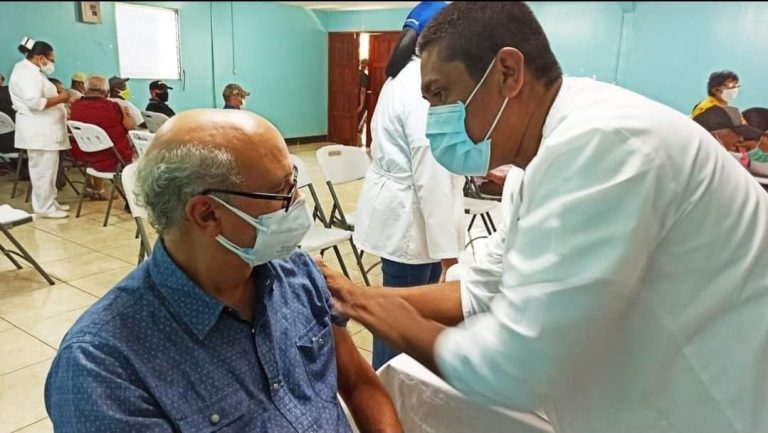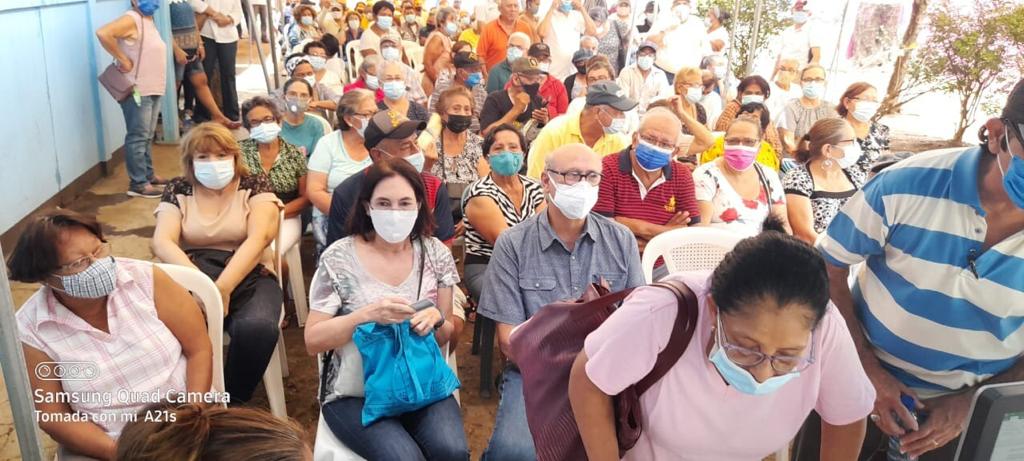23 de abril 2021

Children of Exile: The Births “Sowing Hope” in the Camp of Nicaraguan Farmers

PUBLICIDAD 1M
PUBLICIDAD 4D
PUBLICIDAD 5D
A Health official proclaims to the senior citizens: “Thanks to this government’s political good will, we’ll be giving you the Covishield vaccine.”

Confidencial | Social Netwoorks
On Friday, April 16th, my wife Desiree and I went to a Health Center in Managua for our first dose of the COVID vaccine. We’re both over sixty, and we’d be receiving the Covishield vaccine, donated to Nicaragua by the government of India.
It was our second attempt. The day before, we’d arrived at 3:00 p.m., an hour before the clinic closes. However, they’d run out of vaccines for the day. The same was true at the German-Nicaraguan Hospital, where we went next, and at the Bertha Calderon Hospital. “More people came today than during the first days,” a health worker explained.
When we returned on Friday, before 10 a.m., the Francisco Buitrago Health Center was already full of the elderly. In the reception area, some twenty rows of 8 plastic chairs apiece had been set up under a canvas awning. There were only about 18 inches of distance between them, and almost all the seats were full. We were placed in the next to the last row. From there, at the tail of this human centipede, we began our slow advance through the line.
Everyone had their masks on; some had brought their own hand sanitizer. The Ministry of Health (Minsa) personnel worked diligently and cheerily to maintain order and facilitate the line’s advance. Nonetheless, in such a crowd it was impossible to follow the basic norms of physical distancing recommended by the WHO.

An hour later, we arrived at the first row, where five Minsa workers were waiting at a table. They took our data, then examined our official ID cards to confirm our age and address. They asked me to stand. From behind the Minsa personnel, a professional photographer suddenly appeared, focused his camera on me and began snapping pictures.
From the back rows some boos could be heard, directed at the photographer. Some people shouted: “Why are they taking pictures, if this isn’t political?” A Minsa functionary got up and raised her voice, in an attempt to control the people’s spontaneous grievance. “This isn’t political,” she responded, “it’s an action of our good government, for everyone.” A few pensioners responded: “Everyone here pays for our health benefits, through our taxes.”
A few minutes later, the pictures of me had already been posted on the Ortega regime’s social media accounts. “Recalcitrant opposition leader Carlos Fernando Chamorro receives the COVID-19 vaccine provided by Nicaragua’s good government.” “The government of Comandante Daniel guarantees opposition figure Carlos Fernando Chamorro his right to the COVID-19 vaccine.”
That’s how the ritual of mockery began. They create a show for their party members, of the regime’s critics receiving the vaccine. They do this to underline that the COVID-19 vaccine, like other social services, aren’t rights that pertain to everyone. Instead, they’re a gift that’s bestowed with discretion. “Thanks to the Comandante and the Compañera.”
The same thing happened in other hospitals and health centers, when other opponents of the regime came to receive their vaccinations. Human rights defender Vilma Nuñez; former head of the Civic Alliance Carlos Tunnerman; Luis Carrion Cruz from the Unamos movement; writer and journalist Edgar Tijerino; and Fabio Gadea, director of Radio Corporacion, to give some examples.
When the registration process ended, we were directed to a second waiting area, much larger than the previous one. Here, there were at least 25 rows of 12 seats each, in a roofed area that held over 300 people.
This time, the advance was slower, because there were a lot more people. The heat was suffocating. We arrived at the midpoint of our advance at about 12:15 pm. At that moment, a functionary appeared, with the air of being the “political coordinator”. In an imperious tone of voice, he ordered everyone to be silent and began his speech. “Thanks to the political will of this government, we’re administering the Covishield vaccine, from India,” he proclaimed.
He warned that we’d all have to sign a “voluntary consent” form, freeing the government from any responsibility. However, he continued, we shouldn’t worry, because – “Thanks to Jesus Christ” – the vaccine hadn’t caused any adverse reactions. If we should experience any secondary effects, we could go to any hospital or health center.
A pleasant Minsa worker took our blood pressure, and we continued advancing. Finally, an hour later, we were in the first row, once again filling out our data. I signed the Minsa form, giving my “voluntary consent”. The form itself was crowded with propaganda. In the upper right corner, it said: “2021, Victorious Hopes”. The lower right was emblazoned with one of the FSLN campaign slogans: “Daniel, a united Nicaragua triumphs.”
I don’t know if the speech of the Minsa functionary acting as “political leader” is part of the National Vaccine Plan’s protocol. In my case, I had to listen to him twice. The second time, the functionary – now standing only some three yards from me – began his discourse with the same phrase. He reiterated that we were going to receive the Covishield vaccine: “Thanks to the political will of this government.”
Around 1:20 p.m., we entered a closed office, in a group of ten. That’s where the vaccines were being stored, and would be applied. First, however, we had to go through a new data registration. The Minsa functionary acting as the “political head” was supervising all the details. He pointed me to the person who would receive me.
Behind the computer was a young man in a white polo shirt. Unlike the other personnel, whose white shirts were unadorned, or had only a Minsa logo, his sported a very prominent badge. The inscription, in red and black letters, read: “Sandinista Leadership Council”. On the left sleeve was another insignia, with the letters FSLN.
“Chamorro Barrios, Carlos Fernando,” he read as he typed.
“Doña Violeta’s son? Your address?”
When he had finished filling out the form, I asked him:
“Your shirt – Is that the Health Ministry uniform?”
“Of course it is,” he answered, not paying much attention to me.
“But your shirt says FSLN.”
“That’s because I dripped coffee on my shirt, and they lent me this one outside,” he justified.
Finally, at 1:30 p.m., I was finally ready to be vaccinated. A Minsa assistant displayed the vaccine vial, with the green “Covishield” label, and diligently applied it. At that moment, the photographer reappeared, now accompanied by two assistants. Using their cellphones, they conducted a photoshoot where I seemed to be the only subject.
Twenty minutes later, my wife and I were completing the mandatory rest period after being vaccinated. By that time, the Ortega social networks were already premiering the photos, and celebrating. “Carlos Fernando Chamorro, the independent pseudo-journalist, has received the vaccine. He’s been vaccinated against rabies and Covid, the filthy sell-out.”
PUBLICIDAD 3M
Periodista nicaragüense, exiliado en Costa Rica. Fundador y director de Confidencial y Esta Semana. Miembro del Consejo Rector de la Fundación Gabo. Ha sido Knight Fellow en la Universidad de Stanford (1997-1998) y profesor visitante en la Maestría de Periodismo de la Universidad de Berkeley, California (1998-1999). En mayo 2009, obtuvo el Premio a la Libertad de Expresión en Iberoamérica, de Casa América Cataluña (España). En octubre de 2010 recibió el Premio Maria Moors Cabot de la Escuela de Periodismo de la Universidad de Columbia en Nueva York. En 2021 obtuvo el Premio Ortega y Gasset por su trayectoria periodística.
PUBLICIDAD 3D